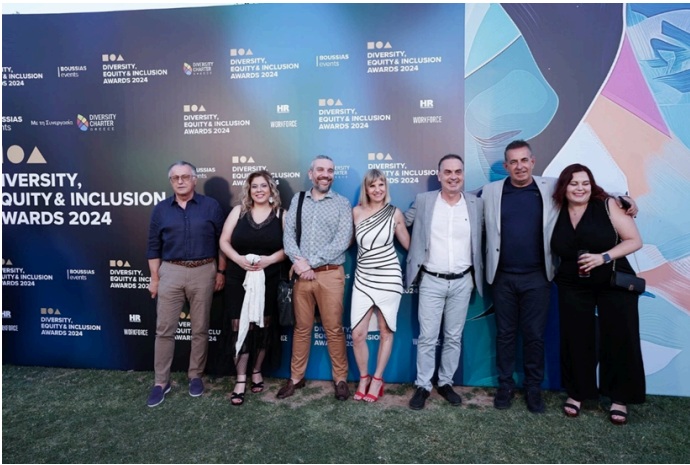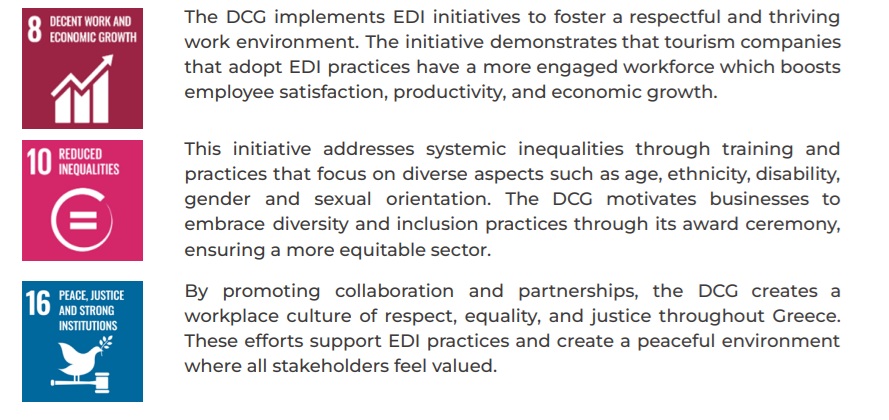Diversity Charter Greece: a national commitment to inclusion
The Diversity Charters, initiated by the European Commission in 2010, aim to promote workplace equality across the EU. The Diversity Charter Greece (DCG) is implemented by two organisations: the Cell of Alternative Youth Activities (KEAN) and the Institute for Diversity and Inclusion. KEAN, established in 2004, focuses on advancing universal human values, peace, prosperity, and environmental protection. The Institute, founded in 2019, was created to support the DCG by coordinating all diversity-related initiatives.
Context
Greece became the 23rd country to adopt a Diversity Charter, in 2019, as part of the EU’s Charters gradual expansion. Through partnerships and collaboration between members, this commitment promotes equal and inclusive opportunities in the workplace through six key pillars: gender, age, ethnicity, disability, sexual orientation, and religion. The DCG plays a crucial role in the tourism sector by promoting EDI practices aimed at reducing workplace discrimination and enhancing employee satisfaction while also improving the tourist experience. These practices are designed to address biases, reinforce core EDI principles, and extend their impact across the tourism industry in Greece. The DCG is supported by approximately eighty employees from KEAN and five staff members from the Institute for Diversity and Inclusion.
Implementation
The DCG was launched with the support of various governmental organisations, including the EU Commission’s Diversity Charter, the General Secretariat for Gender Equality of the Ministry of Interior and the Economic and Social Council of Greece. Subsequently, the DCG sought to establish partnerships with organisations active in various diversity pillars. To engage members actively and enhance EDI skills across Greece, the DCG implements a multi-range of initiatives. Firstly, the DCG hosts open diversity days where executives exchange insights on diversity pillars, improving the understanding and implementation of EDI initiatives. The DCG proceeds to formulate diversity actions along with the European Commission and invite tourism businesses to implement these practices. The organisations share their success factors and challenges faced, and the insights are published in a newsletter. The DCG offers webinars to member organisations to disseminate EDI best practices. These examples are also presented on an annual conference to motivate other Greek companies to adopt similar strategies. Additionally, the conference showcases new EDI international trends as a preview for the following year. Lastly, the DCG holds diversity and inclusion awards to celebrate organisations that successfully integrate EDI into their operations.
Furthermore, the DCG offers diversity and inclusion training to address stereotypes within the Greek culture, highlighting the importance of addressing unconscious bias in the tourism sector, characterised by a high level of interaction with diverse individuals. The DCG participates in European projects to expand these practices across Europe. One notable initiative is a diversity certification scheme, developed in collaboration with Eurocert S.A. under the “Inclusive Workplace” logo. This pioneering scheme is grounded in ISO 3415 and key principles of the Charter, aiming to provide certification for a three-year period, along with annual monitoring of EDI integration within organisations. This initiative enhances the measurement of EDI outcomes and moves away from reliance on informal communication, offering a more structured empirical approach.
Enabling Factors
The successful implementation of the DCG was largely enabled by the support of the European Commission, which provided guidance, and approval for key actions. Additionally, the Greek State’s parallel support helped drive these efforts. Another key factor is the growing prioritisation of EDI issues by Greek businesses, especially within the tourism sector, as part of their corporate social responsibility. This shift is influenced by globalisation, which drives the need for more relevant actions and adoption of EDI practices.
Barriers
The main challenge the DCG faces in implementing its initiatives is achieving widespread acceptance of diversity. While some businesses fully embrace EDI principles, others resist these changes, creating social divides. Another significant obstacle is the persistence of stereotypes, which are often unrecognised by stakeholders themselves, along with a partial lack of unconscious bias training. The goal is for diversity to be acknowledged without becoming a barrier, ensuring individuals are valued solely for their contributions in the workplace. DCG addresses these challenges through intensive EDI training.
Impact on the Organisation
The DCG implements significant EDI initiatives that enhance employee satisfaction. Member companies that embrace these actions not only become more productive but also more appealing to prospective employees. These organisations support a culture that recognises the importance of EDI, enhancing a greater acceptance and respect for diversity among management and staff. Additionally, these initiatives strengthen the company’s image and enhance customer satisfaction, reflecting the growing demand for EDI in Greek culture.
Quotes
‘The role of education is catalytic to prevent parents from ‘passing on’ their stereotypes to their children and consequently to future employees, executives, etc.’
‘The key future challenge is that diversity should neither unite nor divide us, that it should be invisible and not concern us.’
‘Diversity constitutes uniqueness, every person is unique, and this must be respected.’
‘Acceptance of diversity has only benefits for the employee, the employer, the company and society.’
Lessons Learned
The DCG has observed that companies prioritising EDI are better equipped to address and challenge stereotypes, leading to a stronger and more inclusive workplace culture. These companies also report that employees feel more empowered to assert their rights. Finally, all stakeholders experience greater freedom to express diverse opinions.
Future Plans
Future DCG initiatives will focus on expanding EDI training tailored to the unique diversity needs of each company, promoting more inclusive environments. These efforts will be supported by partnerships with specialised training companies. Additionally, the DCG plans to address emerging EDI issues such as ageism linked to the generation gap and employees aged 40-45 leaving the workforce. The rapid pace of these trends complicates long-term planning. However, DCG’s strategic plan aims to create incentives and actions to inform, raise awareness, and educate businesses and stakeholders on EDI issues.
Links with UN Sustainable Development Goals
Download the full EDI report here





No Comments